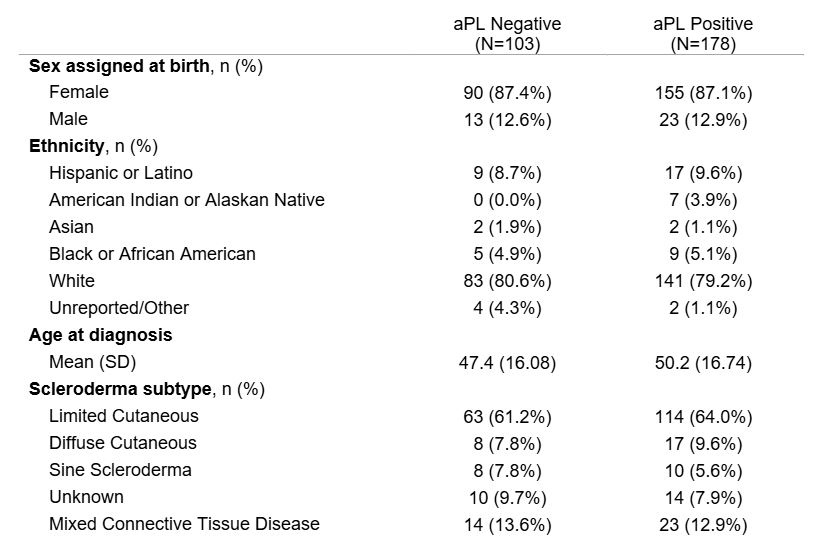Session Information
Date: Sunday, October 26, 2025
Title: (0671–0710) Systemic Sclerosis & Related Disorders – Clinical Poster I
Session Type: Poster Session A
Session Time: 10:30AM-12:30PM
Background/Purpose: APS is a pro-thrombotic autoimmune condition often associated with other systemic autoimmune rheumatic diseases (SARDs), most notably SLE. The link between aPL positivity and other SARDs is less understood. Specific to systemic sclerosis (SSc), the occurrence of thrombotic events is variable in aPL-positive SSc patients as per prior studies. The objective of this retrospective study is to compare the prevalence of vascular manifestations in a cohort of aPL-positive SSc patients to aPL-negative SSc patients in a North American cohort.
Methods: The electronic medical record was reviewed for eligible patients through a copyrighted data capture tool. All patients had SSc diagnosed by a rheumatologist. A total of 365 patients who were tested for at least one aPL were identified. Patients were categorized as aPL-positive patients if they had positive serologies for at least one aPL (aCL IgG/IgM, anti-beta-2-glycoprotein 1 IgG/IgM, or LA) (n=178), and as aPL-negative patients were included if they had been tested for at least one aPL and were found to be negative (n=187). Positive serologies were based on the Mayo Clinic Laboratories—at least 15 aCL or anti-beta-2-glycoprotein 1 units, or a positive LA profile interpretation. Outcomes of interest included: history of pulmonary embolism (PE) or deep venous thrombosis (DVT), pulmonary arterial hypertension (PAH), stroke, digital ulcers, and miscarriage. In the primary analysis, vascular outcomes were compared between the aPL-positive group (n= 178) and the aPL-negative patients who had been tested for all three aPLs (n=103). In the secondary analysis, outcomes were compared between positive and negative patients for each specific aPL.
Results: In the primary analysis, there were significantly more unprovoked PE/DVTs (75.8% vs. 45.6%) in the aPL-positive group (p=0.007, Table 2). No significant differences were found in the history of digital ulcers, PAH, renal crisis, heart failure, miscarriage, or ischemic stroke. In the secondary analysis, patients testing positive for aCL IgG/IgM had significantly greater prevalence of unprovoked PE/DVTs (p=0.037). Patients positive for anti-beta-2-glycoprotein 1 IgG/IgM had significantly greater prevalence of digital amputations (p=0.013). In LA-positive patients, mean total lung capacity (TLC) as measured by PFT was decreased (p=0.006), and mean pulmonary capillary wedge pressure (PCWP) as measured by RHC was increased (p=0.022).
Conclusion: In our retrospective cohort of SSc patients, those with positive aPLs had a stronger association with unprovoked PE/DVTs. Furthermore, there were suggestions of association with specific vascular events in the presence of certain aPLs: aCLs with unprovoked PE/DVTs, anti-beta-2-glycoprotein-1 with more severe Raynaud’s disease manifestations, and LA with reduced TLC (pertinent to interstitial lung disease) and increased PCWP (pertinent to pulmonary hypertension). These findings need to be evaluated prospectively and in other cohorts.
 Baseline Characteristics of Patients in Primary Analysis
Baseline Characteristics of Patients in Primary Analysis
.jpg) Primary Analysis of aPL Negative vs. aPL Positive Patients
Primary Analysis of aPL Negative vs. aPL Positive Patients
.jpg) Sensitivity Analysis of Outcomes Between Positive and Negative Patients for Specific Antibodies
Sensitivity Analysis of Outcomes Between Positive and Negative Patients for Specific Antibodies
To cite this abstract in AMA style:
Shing V, Thompson E, Terwilliger E, Nimal S, Diaz Arumir Vergara A, Pham M, Nagaraja V. Vascular Events in Systemic Sclerosis Patients with Anti-Phospholipid Antibodies [abstract]. Arthritis Rheumatol. 2025; 77 (suppl 9). https://acrabstracts.org/abstract/vascular-events-in-systemic-sclerosis-patients-with-anti-phospholipid-antibodies/. Accessed .« Back to ACR Convergence 2025
ACR Meeting Abstracts - https://acrabstracts.org/abstract/vascular-events-in-systemic-sclerosis-patients-with-anti-phospholipid-antibodies/
